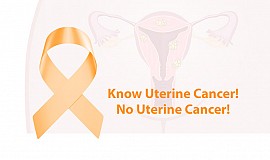About Uterus Cancer
The uterus (an upside down pear shaped organ) is a hollow female reproductive organ located in the pelvis, commonly known as the womb. Three distinct parts make up the uterus: fundus- the top part, corpus- the middle part and cervix- the bottom part. The main function of the uterus is to support fetal development until birth.
Cancer which develops in the tissue of uterus is called uterine cancer. Cells in the uterus sometimes change and no longer grow or behave normally. These changes may lead to non-cancerous or benign conditions such as endometriosis. They can also lead to non-cancerous tumours such as uterine fibroids. Changes in the cells of the uterus can also cause precancerous conditions. This means that the cells are not cancerous but have a high risk of turning into cancer cells. The most common precancerous condition of the uterus is a typical endometrial hyperplasia. There are two types of uterine cancer- endometrial cancer which begins in the lining of uterus and make up 95% of all uterine cancer and uterine sarcoma which begins in the connective tissue or muscular layer of uterus called uterine leiomyosarcoma.
Endometrial carcinoma can be divided into different types based on the type of cell involved.
- Adenocarcinoma (most common type)
- Squamous cell carcinoma
- Carcinosarcoma
- Undifferentiated carcinoma
- Small cell carcinoma
linkRisk Factors:
Uterine cancer usually occurs after menopause. Exact cause of uterine cancer is still not known, however there are few factors which can increase the cancer risk, these include:
- Women who are obese and have irregular or infrequent menses are more likely to develop cancer of the endometrium
- Women who have taken certain forms of hormone replacement therapy are at a higher risk. These include women taking hormonal therapy for endometrial overgrowth (hyperplasia), Infertility (women who unable to conceive) and obesity
- Some evidence show late menopause or early menarche also causes uterine cancer
- Therapeutic radiation of the pelvis and family history are some of the other factors that can increase the cancer risk
linkSymptoms:
Few of the most common symptoms include:
- Abnormal vaginal bleeding, ranging from a watery and blood-streaked flow to a flow that contains more blood
- Vaginal bleeding during or after menopause
- Vaginal discharge- pink watery to dark foul smelling
- For premenopausal women- menorrhagia or abnormal uterine bleeding (AUB)
- Pain in the pelvic area and pain during sexual intercourse
- Difficulty or pain while urinating
If any of the above mentioned symptoms are encountered on a regular basis, doctor should be consulted for the same or you can contact our helpline number mentioned on the website.
linkDiagnosis:
- Physical Examination: Medical history is found and pelvic examination is done which helps doctor assess and advice for further investigations
- Ultrasound: It is one of the first tests done to look at the uterus, ovaries, and fallopian tubes in women. The transducer (Pelvic ultrasound) is placed on the skin of the lower part of the abdomen to get pictures of the uterus, ovaries, and fallopian tubes. A transvaginal ultrasound is often preferred for looking at the uterus. It also helps find out if the cancer has spread into the muscle layer of the uterus i.e. myometrium
- Endometrial biopsy: It is the most common performed test for endometrial cancer to know the type of cells involved
- Other tests: CT scan ,MRI and PETCT scans are done to find the spread of the disease
linkPrevention:
- Taking birth control pills (Doctors should be consulted before starting the medication)
- Maintaining a healthy weight and being physically active
- Hormone replacement therapy should be avoided
linkTreatment:
Uterine Cancer Treatment choice depends on where the cancer is and how much it has grown. You may have more than one type of endometrial cancer treatment for yourself. This choice depends on the size of the cancer and how the cells display themselves under the microscope. Cancer of the uterus is often diagnosed early before it spreads and can be treated surgically.
However, other options for the Uterine Cancer Treatment include:
1. Hormone Therapy
2. Chemotherapy
3. Radiation therapy
4. Surgery
Endometrial cancer is treated by one or a combination of treatments such as radiation therapy, immunotherapy, chemotherapy, surgery and hormone therapy. Combination of endometrial cancer treatment are often recommended but depends on the stage and characteristics of the cancer. However, Cancer healer therapy which works on Immunotherapy is effective in treating patients suffering from endometriosis, fibroid uterus and endometrial hyperplasia other than endometrial cancer. Medicines enhance the immune cells of the body thereby acting upon the cancer cells which help to control as well regress the disease. This treatment can be given to the patient along with chemotherapy or radiation therapy without any interference or clash. It even helps patients to combat with the side effects of chemotherapy and radiation therapy so that they can easily and comfortably tolerate it proving it be one of the most effective uterine cancer treatment options. Other than this it also prevents recurrence in cases where the patient has already undergone surgery. At stage IV it gives relief to the patient by providing them a better quality of life with greater chances of survival.
Studies have shown that endometrial cancer may come back, so regular follow-up after your initial treatment is extremely important.








